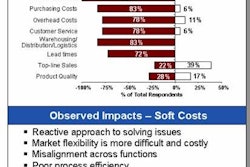Itasca, IL — August 8, 2008 — While outsourcing of supply chain services is still increasing despite the weakened economy, the decision for a company to outsource to third-party logistics providers (3PLs) is not an all or nothing proposition and requires an in-depth evaluation of its entire supply chain process, according to SEKO, a provider of supply chain solutions, including transportation, logistics and IT solutions.
"In today's dynamic global business environment with enhanced technologies and vastly extended supply chains, companies are often confused by the many logistics options available to them," says John Fitzgerald, vice president of global sales and marketing for SEKO. "Before making a decision on how to best implement a supply chain management process, companies should evaluate their own cultural alignment, core competencies and business capabilities."
Fitzgerald said that a company's cultural alignment and cross-departmental capabilities, especially as they relate to technology, will provide the seminal factors in determining whether it should keep supply chain management services in-house, outsource them to a third-party logistics provider, or employ a combination of both.
Fitzgerald suggests six paradigms that companies should abide by when making an outsourcing decision:
Ultimately, Fitzgerald says, an in-depth evaluation of a company's entire supply chain process often reveals that the best solution includes a mix of in-house and outsourced logistics functions.
"In a global economy, where there is no set criterion for supply chain success, companies have to carefully analyze their requirements and determine what logistics processes are best suited to meeting their specific and unique global distribution needs," Fitzgerald says. "Cost is always important, but ultimately the success of any global supply chain management process relates back to client satisfaction as a means of achieving customer focus and growth in market share."
"In today's dynamic global business environment with enhanced technologies and vastly extended supply chains, companies are often confused by the many logistics options available to them," says John Fitzgerald, vice president of global sales and marketing for SEKO. "Before making a decision on how to best implement a supply chain management process, companies should evaluate their own cultural alignment, core competencies and business capabilities."
Fitzgerald said that a company's cultural alignment and cross-departmental capabilities, especially as they relate to technology, will provide the seminal factors in determining whether it should keep supply chain management services in-house, outsource them to a third-party logistics provider, or employ a combination of both.
Fitzgerald suggests six paradigms that companies should abide by when making an outsourcing decision:
- Determine the State of Your Warehouse Management System: How state-of-the art is the WMS system you have in place? If your company is consistently out-of-stock with finished products for your customers, your in-house system probably does not have the IT capabilities to avoid poor lead times and missed shipments for your customers. You need to outsource or lose customers. If, on the other hand, your company has the wherewithal to provide the proper implementation of an enhanced and robust IT infrastructure, you may be able to realize cost-savings and efficiencies by avoiding the need to outsource your logistics functions.
- Take a Good Look at Your Production Facilities: If you find that your production facilities are down for long periods of time and your logistics operations are not flexible enough to meet the requirements of afterhours deliveries and expedited service, you may have no choice but to pay the extra costs by outsourcing your logistics process on top of paying for large overhead for an inflexible logistics operation. If your in-house logistics operation is already funded as a core competency, however, you may already have a competitive edge. Flexibility is the key here.
- Evaluate Your Delivery Date Success: If the targeted dates for your time-sensitive product launches are not consistently being met, it is a good indication that your internal staffing and facility capacity cannot keep up with your customer demand. Your company probably requires the assistance of a 3PL. If, on the other hand, your company properly funds your logistics department and you are already an industry leader in supply chain efficiency and service, you are probably realizing economies of scale with regards to your warehouses, fleets, etc., and can probably maintain these operations in-house.
- Assess Your Overhead and Fixed Logistics Costs: If these expenses are squeezing your bottom line, you may realize virtually instant savings by consolidating your warehouse operations with a "shared" facility operated by a 3PL. This can enable you to move fixed costs to a variable expense, which provides flexibility in responding to market dynamics. If your company culture includes logistics as a driving force in your overall operations, you can probably adequately leverage these expenses in-house.
- Examine Your Company's IT Capabilities: If your in-house technology is unable to adapt to your growing supply chain needs, you should consider outsourcing your company's logistics data and integrating it with that of a 3PL that specializes in customized supply chain solutions. Rather than waiting years for a new system to be developed internally, you may find that outsourcing both the technology and logistics process to a suitable 3PL will realize cost savings, while expediting the supply chain process. On the flip side, if your company fully understands the entire supply chain process and how it fits with your core competencies, you may already possess the in-house ability to optimize your SCM procedures.
- Evaluate Your Company's Customs Compliance Readiness: With the implementation of the Customs Modernization Act, compliance assessments and audits became widely used as a tool to maximize compliance and provide uniformity. Regular assessment of import compliance processes and procedures require an evaluation of the overall effectiveness of the Customs Compliance Program, employee education and training programs, and operating procedures. If your company is unable to develop compliance and cost goals, formal policies, training programs, internal revenues and supplier compliance programs, the selection of a suitable 3PL to provide the required skill sets to establish a process-based compliance function is critical.
Ultimately, Fitzgerald says, an in-depth evaluation of a company's entire supply chain process often reveals that the best solution includes a mix of in-house and outsourced logistics functions.
"In a global economy, where there is no set criterion for supply chain success, companies have to carefully analyze their requirements and determine what logistics processes are best suited to meeting their specific and unique global distribution needs," Fitzgerald says. "Cost is always important, but ultimately the success of any global supply chain management process relates back to client satisfaction as a means of achieving customer focus and growth in market share."








